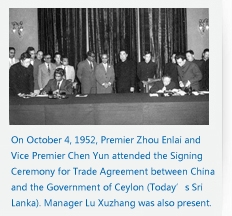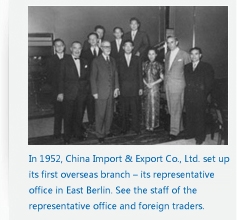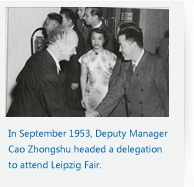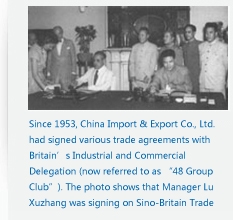Break The Blockade, Have A Difficult Take-off
 China Import Co., Ltd., the predecessor to Sinochem Group, was incorporated in March 10, 1950 as one of the first national foreign trade companies after the founding of New China, and responsible for the trading with other socialist countries including USSR. Lu Xuzhang was its first manager.
China Import Co., Ltd., the predecessor to Sinochem Group, was incorporated in March 10, 1950 as one of the first national foreign trade companies after the founding of New China, and responsible for the trading with other socialist countries including USSR. Lu Xuzhang was its first manager.
Afterwards, to break the “economic blockade and embargo” imposed onChina by US-led Western imperialists and open a channel for trading with Western capitalist countries the Central Government of China decided to incorporate a foreign trade enterprise dedicated to trading with Western capitalist nations. In this context, the idea of setting up China Import & Export Co., Ltd. appeared. Under the leadership of Premier Zhou Enlai, China Import & Export Co., Ltd. was finally created on March 1, 1951 based on the two companies—China Import Co.,Ltd. and North China Trading Co., Ltd., Premier Zhou Enlai gave important instructions in respect of the company’s mission: “Find ‘opportunities’ in western nations, as well as those in Asia and Africa, and try to import from those countries more commodities in great demand”.
As from 1951, China Import & Export Co., Ltd. invited China Resources (Holding) Co., Ltd. entrusted China Resources to be its agent, taking advantage of the favorable position of Hong Kong to trade with capitalist countries, which helped the company import a great deal of high-demand commodities in China, including rubber, fertilizer and agricultural membrane.
By June 30, 1951, China Import & Export Co., Ltd. had transported into China and purchased commodities valued USD 160 million and USD 140 million, respectively, achieving the goal determined by the Central Government.
 The International Economic Conference held in Moscowon 3-12 April 1952 had a postive influence on anti-blockage and anti-embargo. In the course of the conference, Lu Xuzhang, then Manager of China Import & Export Co., Ltd. and member of China delegation, met with over 100 foreign friends of industrial and commercial circles from 30 countries and regions and signed trade agreements and contracts, which totaled to USD 200 million, with customers from 11 countries and regions, such as Great Britain, France and West Germany. Then in summer 1952, the company set up a representative office in East Berlin, which served as China’s window for foreign trade and established gradually trade relationship with countries inWest Europe.
The International Economic Conference held in Moscowon 3-12 April 1952 had a postive influence on anti-blockage and anti-embargo. In the course of the conference, Lu Xuzhang, then Manager of China Import & Export Co., Ltd. and member of China delegation, met with over 100 foreign friends of industrial and commercial circles from 30 countries and regions and signed trade agreements and contracts, which totaled to USD 200 million, with customers from 11 countries and regions, such as Great Britain, France and West Germany. Then in summer 1952, the company set up a representative office in East Berlin, which served as China’s window for foreign trade and established gradually trade relationship with countries inWest Europe.
The signing and execution of Rice-Rubber Agreement marked a milestone in the process of tearing down “blockade” and “embargo”. Rubber was one of the key strategic materials subject to embargo against socialist countries announced by Paris Coordinating Committee, United Nations. With theefforts of the China Import & Export Co., Ltd., onDecember 18, 1952,ChinaandCeylon(Today’sSri Lanka) signed their first Rice-Rubber Trade Agreement betweenChinaandCeylon(referred to as Rice-Rubber Agreement). The Rice-Rubber Agreement stipulated thatChinaexchanged 270,000 tons of rice for 50,000 tons of rubbers fromCeylonevery year, designating China Import & Export Co., Ltd.. This was New China’s first substantial barter pact with a non-socialist country. This Agreement had been remaining in force from 1952 through 1982, for a total of 30 years. The Rice-Rubber Agreement supportedChina’s effort in "Korean War" and played an active role in getting rid of the West’s economic blockade and embargo againstChina, as well as helpingChinaobtain the rubber that was in urgent need.
 In 1955, China Import & Export Co., Ltd. began to deal with import and export businesses with Soviet Russia and East Europe and took the path of “including Soviet Russia, emerging and capitalist nations into the coverage, operating both import and export business”, doing business on a worldwide stage. In addition, as the division of specialty for foreign trade enterprises finished, the company became an import and export company specialized in oil, chemical and pharmaceutical trade. By 1957, the company had established import and export trade relationship with hundreds of customers in 40 countries and regions, more than 30 product varieties exported and the export revenue coming to USD 60 million. Within seven years, the company imported in total 1.62 million tons of crude oil, 7 million tons of various oil products and 600 thousand tons of rubber, which not only met the need for import of energy and raw materials for the purpose of economic construction in new China, but opened import channels for international oil and chemicals, setting the stage for its development into a trading company specialized in oil and chemicals.
In 1955, China Import & Export Co., Ltd. began to deal with import and export businesses with Soviet Russia and East Europe and took the path of “including Soviet Russia, emerging and capitalist nations into the coverage, operating both import and export business”, doing business on a worldwide stage. In addition, as the division of specialty for foreign trade enterprises finished, the company became an import and export company specialized in oil, chemical and pharmaceutical trade. By 1957, the company had established import and export trade relationship with hundreds of customers in 40 countries and regions, more than 30 product varieties exported and the export revenue coming to USD 60 million. Within seven years, the company imported in total 1.62 million tons of crude oil, 7 million tons of various oil products and 600 thousand tons of rubber, which not only met the need for import of energy and raw materials for the purpose of economic construction in new China, but opened import channels for international oil and chemicals, setting the stage for its development into a trading company specialized in oil and chemicals.